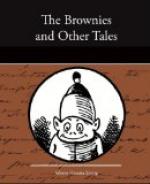“The dogs are noisy,” said the tutor, “too noisy. We must have quiet—peace and quiet.” His lean hand was once more in his pocket, and he pulled out a box, from which he took some powder, which he scattered on the burning log. A slight smoke now rose from the hot embers, and floated into the room. Was the powder one of those strange compounds that act upon the brain? Was it a magician’s powder? Who knows? With it came a sweet, subtle fragrance. It was strange—every one fancied he had smelt it before, and all were absorbed in wondering what it was, and where they had met with it. Even the dogs sat on their haunches with their noses up, sniffing in a speculative manner.
“It’s not lavender,” said the grandmother, slowly, “and it’s not rosemary. There is a something of tansy in it (and a very fine tonic flavour too, my dears, though it’s not in fashion now). Depend upon it, it’s a potpourri, and from an excellent receipt, sir”—and the old lady bowed courteously towards the tutor. “My mother made the best potpourri in the county, and it was very much like this. Not quite, perhaps, but much the same, much the same.”
The grandmother was a fine old gentlewoman “of the old school,” as the phrase is. She was very stately and gracious in her manners, daintily neat in her person, and much attached to the old parson of the parish, who now sat near her chair. All her life she had been very proud of her fine stock of fair linen, both household and personal; and for many years past had kept her own graveclothes ready in a drawer. They were bleached as white as snow, and lay amongst bags of dried lavender and potpourri. Many times had it seemed likely that they would be needed, for the old lady had had severe illnesses of late, when the good parson sat by her bedside, and read to her of the coming of the Bridegroom, and of that “fine linen clean and white,” which is “the righteousness of the saints.” It was of that drawer, with its lavender and potpourri bags, that the scented smoke had reminded her.
“It has rather an overpowering odour,” said the old parson; “it is suggestive of incense. I am sure I once smelt something like it in the Church of the Nativity at Bethlehem. It is very delicious.”
The parson’s long residence in his parish had been marked by one great holiday. With the savings of many years he had performed a pilgrimage to the Holy Land; and it was rather a joke against him that he illustrated a large variety of subjects by reference to his favourite topic, the holiday of his life.
“It smells of gunpowder,” said Jim, decidedly, “and something else. I can’t tell what.”
“Something one smells in a seaport town,” said Tom.
“Can’t be very delicious then,” Jim retorted.




